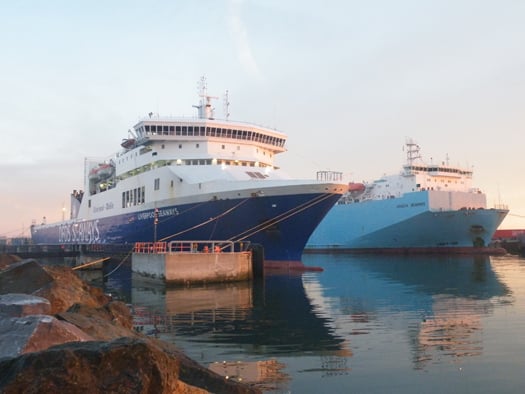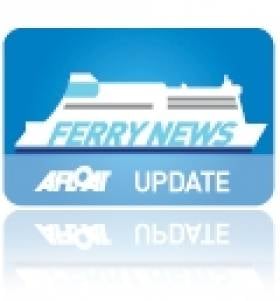Displaying items by tag: OFT
DFDS Seaways Makes Final Irish Sea Departure
The ro-pax Dublin Seaways made a last crossing with a Saturday morning arrival at Birkenhead. After disembarking passengers, vehicles and freight traffic, the 21,856grt vessel immediately departed the Mersey for a short-term deployment on the company's North Sea Rosyth-Zeebrugge service.
Sistership, Liverpool Seaways also completed her last crossing to Birkenhead with an overnight Saturday sailing. This was the final scheduled sailing under DFDS Seaways ownership and marked the last foot-passenger crossing on the Liverpool route as rival operators P&O (Irish Sea) and Seatruck Ferries do not cater for this market.
The vessel returned to Dublin yesterday from Birkenhead; this was to facilitate the loading of drop-trailers and terminal based tugmasters (engine-driven truck/cabs) that tow unaccompanied trailers on the roll-on roll-off vessels. After a short turn around at the terminal, Liverpool Seaways departed Dublin, bound for Immingham. The UK east coast port is where DFDS operate an extensive freight route network across the North Sea.

The ro-pax Liverpool Seaways and freight-ferry Anglia Seaways berthed in Dublin Port yesterday prior to sailing away from the Irish Sea. Photo Jehan Ashmore / ShipSNAPS
In addition the 13,704grt Anglia Seaways also docked in Dublin yesterday from Heysham to perform similar duties like the Liverpool Seaways. Several hours later, the 114-trailer capacity vessel set a southbound course past The Muglins, bound for Avonmouth.
DFDS cited its decision to exit entirely from Irish Sea sector due to the sharp decline in the Irish and UK economies in 2008 and 2009. The company suffered continuous losses on its remaining routes and the issue of over-capacity, particularly on the north Irish Sea.
Only last December, the Danish owned shipping operator sold its other two Irish Sea routes to Stena Line in a £40m acquisition deal. This is all the more remarkable considering DFDS Seaways purchased the previous route operator, Norfolkline's Irish Sea division of their four routes and seven vessels, in July 2010.
The sale to Stena covered the three terminals used on the Belfast routes to Birkenhead and Heysham, which is another freight-only service. In addition the acquisition involved the sale of the South Korean built freight-ferries Hibernia Seaways and Scotia Seaways; like the Anglia Seaways they were all former Norfolkline / Maersk Line vessels.
Interestingly the acquisition is to include the purchase of the chartered 27,510grt ro-pax sisters Lagan Seaways and Mersey Seaways. When the Visentini built sisters were completed at the Italian shipyard, they were placed on the Belfast-Birkenhead route in 2005.
On 1 December Stena Line UK Ltd acquired DFDS Seaways Irish Sea Ferries Ltd (since renamed Stena Line Irish Ferries Ltd). Although the acquisition of SL ISF by Stena Line has been completed and DFDS no longer owns SL ISF, Stena Line await formal approval from the Irish competition authority and the UK's Office of Fair Trading (OFT) to integrate SL ISF into the wider Stena Line business.
In the meantime during this transitional period, it is business as usual for customers using the Belfast-Birkenhead and Belfast-Heysham routes. Online bookings continue to be accepted on www.dfdsseaways.com or tel: (01) 819 2999 and in the UK tel: 0871 230 033





























































